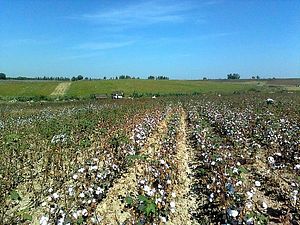In an age where “fake news” and “alternative facts” have become global shorthand, media and research integrity are sorely needed antidotes for citizens bereft of reliable information, especially in regions where populations are facing oppression, violence, surveillance, and corruption at intolerable levels. This is why the claims made by the International Labor Organization and World Bank, as reported in a Foreign Policy article documenting forced labor in the World Bank’s operations in Uzbekistan, demand a closer analysis.
Uzbekistan’s state-run cotton industry operates as part of a repressive apparatus carried through from the Soviet Union and repurposed to support the largely illicit activities of an elite cabal, who operate the Uzbek state through secretive clan networks. Overseeing this predatory system is the SNB, the KGB’s successor in Uzbekistan. Its agents infiltrate all sectors of society and terrorize those who fail to comply with official dictates.
Over the past two decades, millions have been forced into the cotton fields – under the foreboding specter of organized state violence – and made to pick cotton for derisory pay, often in deplorable conditions. The considerable profit extracted from this illicit trade disappears into the government’s opaque fiscal apparatus, almost certainly privatized by political barons and their clan affiliates, who operate state machinery as fiefdoms.
None of this sobering reality is apparent in a report published by the ILO under World Bank patronage, which has come under sustained criticism following a rigorous study just released by Human Rights Watch and the Uzbek-German Forum for Human Rights.
The ILO observes that seven experts from the organization undertook a six-week field trip to Uzbekistan. They confirm that at all times they were chaperoned by a counterpart from the Federation of Trade Unions of Uzbekistan (FTUU), but claim that their research was conducted independently of the Uzbek government. This should raise eyebrows. Professors Simon Clarke and Vadim Borisov explain why – the FTUU has “retained all of the structures and practices of the Soviet era intact,” which has involved its “complete absorption” into “the state apparatus.”
The ILO exhibits no evident concern that their fieldwork was undertaken hand-in-glove with state minders, or for that matter, that foreign investigators who slip the surveillance apparatus and conduct independent inquiry have been deported from Uzbekistan when caught (which is considerably better treatment than when the same is done by local investigators).
Nor does the ILO evidence any awareness of the serious ethical breaches their stated methodology involves. We are talking here about interviews conducted with vulnerable cotton pickers – who are not afforded even the most basic human right protections – under the general specter of a state that operates a vicious system of surveillance and punishment, with its agents in immediate proximity.
This would never pass a university ethics committee – at least one worthy of the name – and if a researcher went rogue and emulated the ILO approach it would be grounds for dismissal.
Perhaps what is most infuriating about the report is that none of the essential political context is ever acknowledged. As a result, the ILO does not attempt to justify its methodology against the complex environment it is actually being deployed in.
The only acknowledgement of the challenges associated with conducting research in a society ruled over by totalitarian state – where the government is a research “partner,” no less – comes indirectly, when the report creaks under the contradictions of its approach.
The ILO acknowledges, “getting beyond what ILO experts were given to hear was at times difficult. Many interviewees appeared to have been briefed in advance.” Despite witnessing the symptoms of a deeper system of ideological control, the ILO did not feel this fundamentally tainted their sample. Indeed, the report contends that “ILO experts can simply record what they observe and are told; it is not possible for them to verify the information received.”
If data cannot be verified, it shouldn’t be published, much less relied upon to make grand statements on a human rights issue of burning global significance.
In another example of tainted methodological seeds bearing poisoned fruit, the ILO reports affirmingly that complaint hotlines have been set up, manned by the Ministry of Labor and the Federation of Trade Unions, incorporating “international best practice.” Yet no mention is made of the fact that phone communications in Uzbekistan are monitored by the SNB, or that in the past users have faced recriminations.
Many other examples could be pointed to, which predictably flow from the study’s parlous methodology.
On this flawed basis, the report’s conclusion is what the World Bank wanted to hear: the districts receiving funds for World Bank projects are, according to ILO, not affected by forced labor. The remainder of the country remains at risk of forced labor, yet not a single specific case could be identified.
The ILO monitoring report gives succor to one of the most oppressive regimes in the globe today, and buttresses the façade essential to continued labor abuses and corruption in Uzbekistan’s cotton industry, which occurs sadly with international complicity.
Dr. Kristian Lasslett is Director of the Institute for Research in Social Sciences at Ulster University, and sits on the Executive Board of the International State Crime Initiative.

































